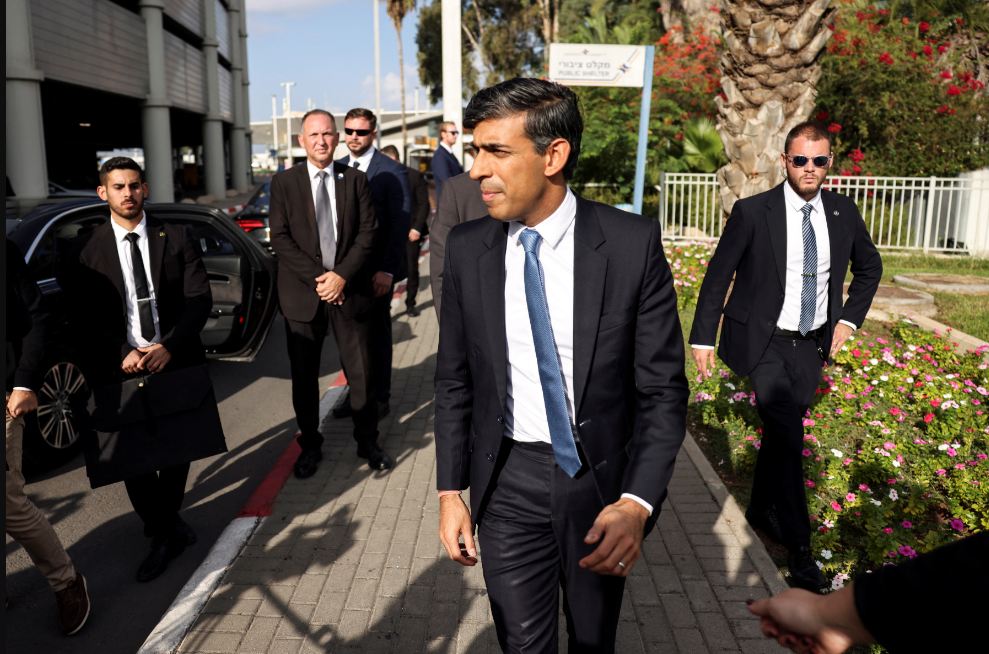Israel’s Netanyahu says Hamas attack was aimed at derailing peace
Jerusalem (Reuters) – Israeli Prime Minister Benjamin Netanyahu said on Thursday the Hamas attack on Israel was aimed at preventing the expansion of peace in the Middle East, and called on British Prime Minister Rishi Sunak to keep supporting Israel’s Gaza counteroffensive.
Sunak is the latest Western leader to visit Jerusalem to show support for Israel and to try to negotiate a way to secure the release of hostages taken by Hamas and ease the provision of humanitarian aid to people in Gaza.
The British leader later on Thursday will fly to Saudi Arabia to meet Crown Prince Mohammed bin Salman, Sunak’s spokesperson said. Sources have said Saudi Arabia has put U.S.-backed plans to normalise ties with Israel on ice.
Netanyahu said the attack from Gaza by Palestinian Islamist group Hamas, which killed 1,400 people in Israel, was aimed at derailing attempts to establish a wider peace in the region.
“We were on the cusp of expanding that peace, and destroying that move was one of the reasons why this action was taken,” Netanyahu told Sunak at their meeting in Jerusalem.
“This is our darkest hour,” he added. “That means that this is a long war, and we’ll need your continuous support.”
Sunak met Netanyahu after holding talks with Israeli President Isaac Herzog. He welcomed the decision to allow aid into Gaza, saying he knew Israel was “taking every precaution to avoid harming civilians in direct contrast to the terrorists of Hamas”.
Earlier, Sunak and Herzog underlined the need to avoid an escalation of violence in the region, which has sparked angry demonstrations in some countries, including over an explosion at a hospital in Gaza which Palestinians blamed on Israel.
Israel denies it carried out the attack and U.S. President Joe Biden said U.S. evidence supported the Israeli account that the incident was caused by a failed rocket launch by Palestinian fighters.
Sunak’s spokesperson said the British government was still waiting for a report from the security services before offering its opinion.
“We will stand with you in solidarity with your people and your right to defend yourself, to bring security back to your country, to your people, to ensure the safe return of the hostages that have been taken,” Sunak said in a televised part of the meeting with Herzog.
“Palestinians are victims of what Hamas has done. It’s important that we continue to provide humanitarian access.”
At least seven British nationals have been killed and at least nine are still missing since the attack on Israel, Sunak’s spokesperson said, adding that at least two of the nine were being held hostage in Gaza.
Sunak’s planned trip to Saudi Arabia is part of coordinated efforts with his foreign minister, James Cleverly, who is in Egypt and will visit Turkey and Qatar over the next three days.
Cleverly, who visited Israel last week, met Egyptian Foreign Minister Sameh Shoukry and will meet ministers in Turkey and Qatar, all countries Britain say are “vital to international efforts to uphold regional stability, free hostages and allow humanitarian access to Gaza”.
The flurry of diplomacy is a step change from what some commentators say has been a decade of declining British influence in the Middle East, with London being seen as a junior partner of the United States.
The last British prime minister to visit Israel and the occupied West Bank was David Cameron in 2014. In 2022, the government quietly axed a ministerial post dedicated to relations with the Middle East, combining that role with North Africa, South Asia and the United Nations.



